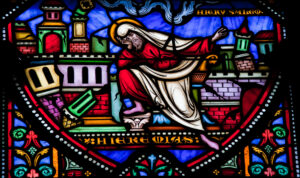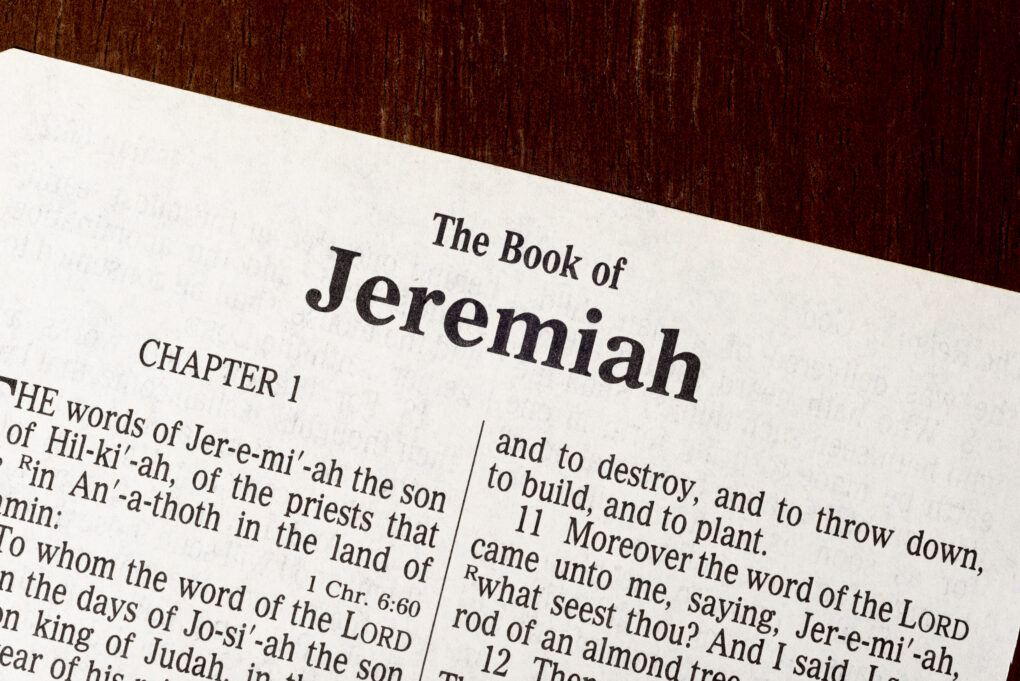Hebrew Prophets – Jeremiah
The second prophet we would like to meet is Jeremiah. His name in Hebrew is Yirmeyahu which can be translated as God will exalt or God will throw. Jeremiah was set aside as a prophet before birth, and he was called by God to ministry at a young age (Jeremiah 1:5,9-10). Jeremiah’s task was to deliver God’s messages to Judah and to the nations.
God gives Jeremiah an overview of his prophetic ministry in Jeremiah 1:9-10:
Then the Lord reached out his hand and touched my mouth and said to me, “I have put my words in your mouth. See, today I appoint you over nations and kingdoms to uproot and tear down, to destroy and overthrow, to build and to plant.”
What do we know about Jeremiah’s background?
 Jeremiah was the son of Hilkiah, a Levitical priest. He was born between 650 and 645 BC and lived in a village called Anathoth, located about three miles northeast of Jerusalem in the territory of Benjamin (Jer. 1:1). Jeremiah served as a prophet of God for 40 years through the five kings of Judah: Josiah, Jehoahaz, Jehoiakim, Jehoiachin and Zedekiah. Jeremiah is believed to have written the Book of Lamentations, while Jewish tradition also adds 1st and 2nd Kings under his authorship. The Book of Jeremiah is 52 chapters long which makes it the second longest prophetic book after Isaiah.
Jeremiah was the son of Hilkiah, a Levitical priest. He was born between 650 and 645 BC and lived in a village called Anathoth, located about three miles northeast of Jerusalem in the territory of Benjamin (Jer. 1:1). Jeremiah served as a prophet of God for 40 years through the five kings of Judah: Josiah, Jehoahaz, Jehoiakim, Jehoiachin and Zedekiah. Jeremiah is believed to have written the Book of Lamentations, while Jewish tradition also adds 1st and 2nd Kings under his authorship. The Book of Jeremiah is 52 chapters long which makes it the second longest prophetic book after Isaiah.
Jeremiah is often known as the weeping prophet, mainly because of the nature of his messages and how he was treated by other people. He must have been a sensitive and compassionate man who wept over the stubbornness of his people as they refused to repent of their idolatrous ways and evil practices (Jeremiah 13:17). Jeremiah declared destruction to Judah and Jerusalem, but nobody took him seriously. Instead, they mocked and threatened him (Jer. 20:7; 11:18-21). Even his own family turned against him (Jer. 12:6). Jeremiah suffered so much persecution in his lifetime – he was beaten and put in the stocks at the Upper Gate of Benjamin for a day (Jer. 20:1-2); his life was threatened as the mob did not want to believe his words (Jer. 26:7-9); he was beaten, imprisoned and accused of being a deserter to the Babylonians (Jer. 37:11-16); he was arrested and lowered by ropes into a cistern full of mud (from which he was rescued by a kind court official) (Jer. 38:1-6). We do not know for certain how Jeremiah’s life ended. The Bible says that he was taken to Egypt against his will by a group of rebels who did not listen to his warning to not leave Judah. He probably died in Egypt, and some Christian traditions claim that it was by martyrdom as he continued to speak out what the Lord had impressed on his heart.
What does Jeremiah say about Judah and Israel?
Jeremiah prophesied at a very dark time for the people of Judah. All the kings, except Josiah, he lived under were evil and the sin of the nation was great. The hearts of the people were so hardened that they thought that they could do any detestable thing and get away with it. The Lord asks the people:
“Will you steal and murder, commit adultery and perjury, burn incense to Baal and follow other gods you have not known, and then come and stand before me in this house, which bears my Name, and say, “We are safe”—safe to do all these detestable things? Has this house, which bears my Name, become a den of robbers to you? But I have been watching! declares the Lord.” (Jer. 7:9-11)
Jeremiah’s mission was to call people to repentance and, since this call went unheeded, to proclaim impending judgement on them. Jeremiah was one of these prophets who declared the destruction of Jerusalem by the Babylonians and the captivity of the people, which happened in 586 BC (though some were deported even earlier).
However, while proclaiming the impending disaster, Jeremiah also gave words of encouragement and hope of restoration to Judah and to Israel. His prophecies contain the most powerful predictions of how the God of Israel will gather His people from the four corners of the earth and bring them back to their own land, where He will give them a new heart and a new Spirit (Jeremiah 31 is an excellent chapter about it). The regathering happened initially after 70 years of exile in Babylon, but it has been happening now – in our times – on a much larger scale for well over a hundred years. Jeremiah has a lot to say about this end-time return of the Jews – Aliyah. Here are some examples:
“However, the days are coming,” declares the Lord, “when it will no longer be said, ‘As surely as the Lord lives, who brought the Israelites up out of Egypt, but it will be said, ‘As surely as the Lord lives, who brought the Israelites up out of the land of the north and out of all the countries where he had banished them.’ For I will restore them to the land I gave their ancestors.” (Jer. 16:14-15)
“I will surely gather them from all the lands where I banish them in my furious anger and great wrath; I will bring them back to this place and let them live in safety. They will be my people, and I will be their God. I will give them singleness of heart and action, so that they will always fear me and that all will then go well for them and for their children after them.” (Jer. 32:37-39)
We can sense how God loves his people in the following promise:
I will make an everlasting covenant with them: I will never stop doing good to them, and I will inspire them to fear me, so that they will never turn away from me. I will rejoice in doing them good and will assuredly plant them in this land with all my heart and soul. (Jer. 32:40-41)
In some Christian circles it is believed that God’s promises to Israel as a nation are not valid anymore, and that the Church has replaced Israel and is the recipient of all of God’s promises (Replacement Theology). If this is the case, we would have to explain away or even discard the bulk of the Old Testament. Although Christians take great comfort in multiple scriptures of the Old Covenant, applying many of them to the Church simply does not make sense. Consider the following scriptures:
Hear the word of the Lord, you nations; proclaim it in distant coastlands: ‘He who scattered Israel will gather them and will watch over his flock like a shepherd.’ For the Lord will deliver Jacob and redeem them from the hand of those stronger than they.’ (Jer. 31:10-11)
This is what the Lord says, he who appoints the sun to shine by day, who decrees the moon and stars to shine by night, who stirs up the sea so that its waves roar—the Lord Almighty is his name: “Only if these decrees vanish from my sight,” declares the Lord, “will Israel ever cease being a nation before me.” (Jer.31:35-36)
“In those days, when your numbers have increased greatly in the land,” declares the Lord, “people will no longer say, ‘The ark of the covenant of the Lord.’ It will never enter their minds or be remembered; it will not be missed, nor will another one be made. At that time they will call Jerusalem The Throne of the Lord, and all nations will gather in Jerusalem to honour the name of the Lord. No longer will they follow the stubbornness of their evil hearts.” (Jer. 3:16-17)
What does Jeremiah say about Jesus the Messiah?
Although Jeremiah speaks a lot about the time in the future when Israel will be regathered in the land where God will make a new covenant with it, the Messiah figure is only mentioned on a couple of occasions. Both scriptures seem to point to a future time when the Messiah is reigning in Jerusalem: for Christians this is the time of Jesus’s return; for Jews it is the time of their nationwide salvation as they finally recognise their Messiah:
“The days are coming,” declares the Lord, “when I will raise up for David a righteous Branch,
a King who will reign wisely and do what is just and right in the land. In his days Judah will be saved and Israel will live in safety. This is the name by which he will be called: The Lord Our Righteous Saviour. (Jer. 23:5-6)
“‘The days are coming,’ declares the Lord, ‘when I will fulfil the good promise I made to the people of Israel and Judah. “‘In those days and at that time I will make a righteous Branch sprout from David’s line; he will do what is just and right in the land.
In those days Judah will be saved and Jerusalem will live in safety. This is the name by which it will be called: The Lord Our Righteous Saviour.’” (Jer. 33:14-16)
How can we relate to Jeremiah on a personal level and in the times we live?
Although reading the book of Jeremiah can be quite a sombre experience, it is also invaluable in the sense that we can learn so much about God as a Father who is trying to teach his children – but they won’t listen. We can sense deep emotional involvement, even disappointment and pain in the way God expresses his heart’s desire for his people:
“What fault did your ancestors find in me, that they strayed so far from me?
They followed worthless idols and became worthless themselves.” (Jer. 2:5)
“I had planted you like a choice vine of sound and reliable stock.
How then did you turn against me into a corrupt, wild vine?” (Jer. 2:21)
“Have I been a desert to Israel or a land of great darkness? Why do my people say, ‘We are free to roam; we will come to you no more’? Does a young woman forget her jewellery, a bride her wedding ornaments? Yet my people have forgotten me, days without number” (Jer. 2:31-32)
God went to great lengths to show his people the condition of their hearts and the impending judgement. One of the ways he did it was by asking Jeremiah to perform prophetic acts. These were not very pleasant to Jeremiah, to say the least. He was not allowed to marry as a sign that there was no future for the next generation. They would all die of diseases, war and famine (Jer. 16:1-4). Once he was asked to buy a linen belt, not to wash it and bury it in the rocks near the Euphrates River. Jeremiah had to dig it up many days later to find that it had become useless. This was an illustration of how God would ruin the pride of Judah and Jerusalem (Jer. 13:1-8). Still another time Jeremiah was asked to make a yoke and fasten it to his neck. He was to send a message to the nations and ask the kings to submit to the yoke of King Nebuchadnezzar of Babylon whom God had chosen to execute his judgements (Jer. 27:2-8).
Looking at Jeremiah’s life, we may wonder why it must be so hard to serve the Lord. The truth is that indeed it is not easy, especially if one has a high calling like Jeremiah did. Although he complained about the harsh messages God gave him, he could not stay silent – the word was burning in his heart:
But if I say, “I will not mention his word or speak anymore in his name,” his word is in my heart like a fire, a fire shut up in my bones. I am weary of holding it in; indeed, I cannot.” (Jer. 20:9)
Prophecy is one of the gifts of the Holy Spirit given to the Church in the New Covenant. Being a prophet of God is a calling that comes with great responsibility and commitment to the will of the Lord. To hear clearly from the Lord, a prophet has to be a pure vessel ready to deliver whatever God requires. This was not easy for Jeremiah, and neither is it easy today. But we know that the God who calls us is the God who equips us and gives us grace to carry out his calling (Hebrews 13:20-21).
Two scriptures stand out in the Book of Jeremiah that have been a great source of comfort and hope for a believer:
But blessed is the one who trusts in the Lord, whose confidence is in him. They will be like a tree planted by the water that sends out its roots by the stream. It does not fear when heat comes; its leaves are always green. It has no worries in a year of drought and never fails to bear fruit. (Jer. 17:7-8)
 “For I know the plans I have for you,” declares the Lord, “plans to prosper you and not to harm you, plans to give you hope and a future.” (Jer. 29:11)
“For I know the plans I have for you,” declares the Lord, “plans to prosper you and not to harm you, plans to give you hope and a future.” (Jer. 29:11)
As mentioned earlier, Jeremiah was also called to be a prophet to the nations. Chapters 46-51 cover the messages he gave to the surrounding nations. There is a pattern to how God’s justice operates in history: God uses nations to chastise his people Israel when they sin, but he does not leave the nations unpunished – because of their idol worship, pride and especially as they overstep the boundaries and express extreme animosity towards God’s people. The best example is the fate of Babylon. Although at one point in history the Babylonian King was the tool God used to exercise judgement on his people, total destruction has been proclaimed to this land not only by Jeremiah but by other prophets, culminating with the events in the Book of Revelation. Babylon is not only a country – it evolves into becoming a symbol of the corrupt world system, which God will judge in the end.

